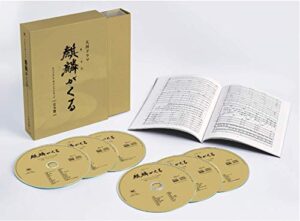人間五十年 / Ningen Gojunen 収録OST: Vol.3 / 完全盤
(この曲の構造時に想像した情景は)信長が一人で部屋で過ごす様子です。戦いの音が外から聞こえ、信長は敗北(死)することを悟り、これまで自分が齎した全ての死と破壊について考えます。
外の音は徐々に朧となり繰り返され、様々な戦いの場面が走馬灯のように頭を駆け巡ります。
– 槍に刺さされて死んだ者
– 火中で死んだ者(多くの信長に反した者は焼かれて死んだ)
– 怯える若者
– 死んだ一般の民
– 怖れ、悲しみ、涙、恐れの表情
(音楽の冒頭は)走馬灯と共に鳴る鈴で始まり、浮遊感のある響きと静かに弓で擦った手持ち鈴(甲高い叫ぶような響き)が加わります。鈴は、魂の記憶を呼び起こす表現として、寺院にあるような鐘のような響きを使用し、異なるリズムで演奏される弓で擦った金属音の響きは、戦に存在した拷問や壮絶な死による痛み、そして浮遊する死者の記憶と魂が表現されています。
(0’18箇所から)混声合唱のアルト(低い女性の声)が懇願し探し求めるように始まります。
息子よ、どこにいる
父よ、どこにいる
弟よ、どこにいる
みつからない、どこにいる
女性合唱が浮かぶようにアルトの歌声に加わります。
(1’19箇所から)男性合唱が始まります。
娘よ、どこにいる
母よ、どこにいる
妹よ、どこにいる
みつからない
— コーラス1部 —
混成合唱と他の楽器により、信長が齎した多くの死が表現されています。一人一人の生前と生後の表情、死顔が信長の記憶に蘇ります。「私の兄弟、父、妹、息子、娘、母はどこにいるのか」、信長に懇願し尋ねる様子が表現されています。
2’10箇所から、混成合唱が始まり、複数の旋律が紡がれるように歌唱されます。(音楽的には)信長のテーマが聴こえますが、声の叫びは辛辣に問いかけるものです。
息子よ(娘よ)、どこにいる
父よ(母よ)、どこにいる
弟よ(妹よ)、どこにいる
みつからない
— 満たされぬ獅子 —
2’55箇所から、声が静まります。その後、(サウンドトラック Vol.4の15曲目「満たされぬ獅子」で使用されている)信長のテーマがソロのチェロによって奏でられます。(遠くで聞こえる)戦う群衆に囲まれ、信長が一人、終わりが迫り寄ることを認識している様子が、チェロのソロ演奏によって表現されています。
この情景は、深刻であり、悲痛、後悔、痛切の念も混在しています。信長は、これまで殺めた者、亡くなった母を思い出しているのかもしれません。(この物語で)信長は母へ強い感情を持ち、認められたいという願うも、十分に感じていませんでした。(一説で語られるように)信長は光秀の母を死に追いやったことを後悔しているのかもしれません。切腹を覚悟し、死に装束を纏っているのかもしれません。あるいは、多くの人を殺めた罪深き人生を後悔しているのかもしれません。
もしくは、自身が死を迎える事を、他の後悔の念を持たずに悔いているのかもしれません。
曲は最後の箇所へ向かいます。
— 後悔と喪失 / 誤った選択 —
光秀が信長に仕えたことを悔いたように、信長も同じく後悔の念があったことが表現されています。5’10箇所から、光秀の後悔の念がエコーし(繰り返し響き)、「息子、父、娘たちが見つからない」という民の声が、信長の中に響き渡ります。
そして曲は展開します。
— 決心の刻 —
(様々な考えや念が巡った後)信長は、武将としての役目を果たすことを決心します。6’03箇所から、(サウンドトラック Vol.2の1曲目「信長」で使用されている)信長のテーマが、行進的な太鼓と共に始まります。信長が、切腹もしくは業火と共に死を迎えることを決心した瞬間かもしれません。
(民の声を表現した)合唱が、(信長の)固い意思を表現されたリズムと共に始まります。
— コーラス2部 —
6’43箇所から、信長のテーマと共に合唱が始まります。同じ歌詞が更に力強く歌唱されます。
息子よ(娘よ)、どこにいる
父よ(母よ)、どこにいる
弟よ(妹よ)、どこにいる
みつからない
(繰り返し)
みつからない
最後の箇所は、混成合唱が主旋律となり、それに信長のテーマを織り重ねることで、大切な人を失った民の声と共に、信長が終焉を迎える様子が表現されています。
Nobunaga is alone. We hear the sounds of battle outside; he knows he is lost and is thinking of all the death and destruction he has caused in his life.
The external sounds gradually become indistinct, echoing as we fade to… Scene: Series of flashback shots of battle such as:
– Man dies on spear;
– Man dies by fire (many of Nobunaga’s enemies died by fire);
– Young man terrified;
– Civilians die; and
– Others – fear, sadness, tears, terror
During these flashbacks, bells enter, accompanied by floating sounds and eerie bowed hand bells (they are the “squealing” sounds). The bells are intended to invoke a feeling of spirituality, such as a temple bell, while other metallic bowed sounds (disconnected from the pulse generated by the temple bells), suggest perhaps the torture of metal during battle, or the agony of people dying violently, or something floating and elusive: memories, spirits of the dead.
The alto voices enter, as though searching, imploring:
“Son of mine, where are you?”
“Father of mine, where are you?”
“Brother of mine, where are you?”
“I cannot find him”
A second women’s choir floats in the background, connected to but not exactly participating in the pulse to which the other voices are singing.
Men Take Over
Then the men sing:
“Daughter of mine, where are you?”
“Mother of mine, where are you?”
“Sister of mine, where are you?”
“I cannot find her”
More voices and instruments join in, representing the tens of thousands that Nobunaga’s campaigns have brought to death. Individual, faces of the dead swim into his memory, some alive, some after death. They implore, question, begging Nobunaga for an answer, “where is my brother / father / sister / son / daughter / mother?”
First Chorus
At 2’10”, the full choir enters, with multiple lines weaving in and out of each other. We can discern parts of Nobunaga’s theme in the voices, but they are not friendly; the voices of the bereaved have grown more demanding:
“Son of mine, where are you?”
“Father of mine, where are you?”
“Brother of mine, where are you?”
“I cannot find him”
Consequences of Unloved Child
After the chorus, at 2’55, we ease back from the voices. Following a pause, Nobunaga’s theme comes in on solo cello; Nobunaga is alone, and he knows that his end is closing in on him, thus the solo cello, “surrounded” by other, cloudy sounds. The intensity grows over time.
It is serious, a little bit sad, or regretful or wistful. Perhaps he is thinking of those he killed, perhaps missing his mother after all – Nobunaga was very attached to her and craved her approval, which apparently he rarely experienced. Maybe he regrets having brought about the death of Mitsuhide’s mother? Maybe he’s putting on ceremonial robes before committing seppuku? Maybe he regrets his sinful life, having killed so many?
Maybe he’s simply regretful that his life is coming to an end?
This moves into…
Regret and Loss / Bad Choices Chords
Just as Mitsuhide regretted his decision to follow Nobunaga, so Nobunaga has regrets. These chords at 5’10 echo Mitsuhide’s feelings but here, in Nobunaga’s case, the choir is also still imploring, “son, father, daughter – I cannot find you.”
This transitions to…
Decisive Moment
Nobunaga reaches a different mindset – more in keeping with his military role. At 6’05 his theme comes back with marching-style drums. He resolves to meet his fate. Maybe he’s decided to commit seppuku, or face the flames.
Then the voices return, over this resolute rhythm…
Second Chorus
The voices return, at 6’43 along with a version of Nobunaga’s main theme underneath. The text remains the same but at a higher intensity level:
“Son of mine, where are you?”
“Brother of mine, where are you?”
“Daughter of mine, where are you?”
“Sister of mine, where are you?”
[repeats]
“I cannot find you!”
Although the choir leads at the end, Nobunaga’s theme continues to play in a sort of contrasting weave with the vocals, as his life comes to an end, with the accusers still calling out for their lost loved ones.
♫ ダウンロード & ストリーミング配信
「人間五十年 / Ningen Gojunen」
from サウンドトラック Vol.3
※ NEXT COMPOSER NOTES
「曙光 / Descended from the Sun」
アルバム
NHK大河ドラマ「麒麟がくる」オリジナル・サウンドトラック Vol.3
[発売日] : 2020.12.23
¥3,000+ 税
ソニー・ミュージックレーベルズ / SICX-30089
アルバム
NHK大河ドラマ「麒麟がくる」オリジナル・サウンドトラック 完全盤
[発売日] : 2021.02.24
¥15,000+ 税
ソニー・ミュージックレーベルズ / SICX-30090 ~ SICX-30095


